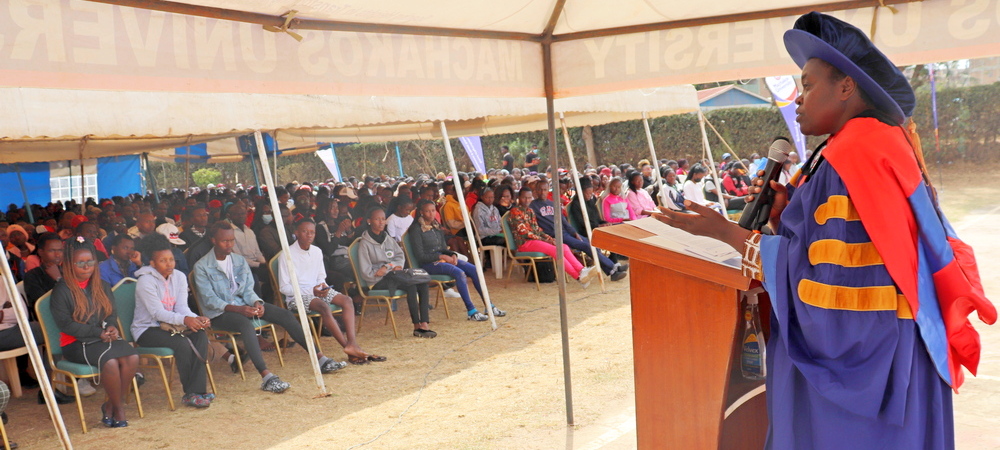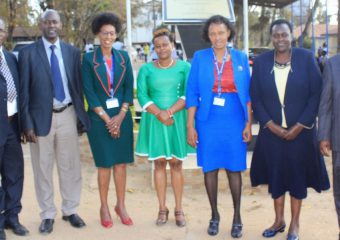REPORT ON THE FIRST WORKSHOP OF EAST-AFRICA NETWORK OF EXCELLENCE FOR UNIVERSITIES OF APPLIED SCIENCES HELD ON 5th -12th October 2018 AT HOCHSCHULE NEU-ULM UNIVERSITY OF APPLIED SCIENCES (HNU) AND TECHNISCHE HOCHSCHULE INGOLSTADT (THI)
The workshop was held on 5th to 12th October 2018 and was hosted by HNU and THI universities in Bayern (Bavaria) State, Germany. The workshop was sponsored by German Academic Exchange Service (DAAD) and was attended by 17 participants from Seven Kenyan Universities. Dr. David Mulwa from the School of Education and Professor Nicodemus Abungu from the School of Engineering in Machakos University attended the workshop.
[caption id="attachment_753" align="alignnone" width="300"] HNU University of Applied Sciences[/caption]
The workshop covered the following areas:
HNU University of Applied Sciences[/caption]
The workshop covered the following areas:
- Applied Teaching and Learning
- Role of Study Dean and Course Evaluation
- Applied Teaching and Usability of the Laboratory
- Curriculum planning and Design for Universities of Applied Sciences
- Internship Organization
- Design and Offering of postgraduate Programs
- Perspectives of Universities of Applied sciences in Germany
- Preparation for the new faculty of Universities of applied sciences
- Visit to the industry to have an experience of university-industry linkage
 Workshop Participants from Kenyan Universities[/caption]
Lessons Learned
1) Most of the universities have a close link with the industry and during the students’ internship which lasts for six months, the students have to identify an industry related problem and write a thesis within a period of three months to come up with a tangible solution to the problem. Each student must be adequately prepared to fit in the work industry before they graduate.
2) The industry is an active partner in development of curricular of the universities and the professors and lecturers for the universities of Applied sciences have to have a relevant industry experience of at least five years. It is the individual professor who creates his industry linkage, not the university
3) Companies in Germany especially the Bavaria (Bayern) region give information and orientation to pupils from secondary schools for their further education and give job offers and the products they deal with.
4) There is the Centre for university didactics (pedagogy) which trains new lecturers for the Universities of Applied Sciences. The Centre is funded by the ministry of education
and it regularly in-services the new employed lecturers for the universities of applied sciences.
5) Each university of applied sciences has a niche determined by the education ministry and tries to enhance what it is best known for without suffocating other existing programs. For example, HNU has its niche management, while THI is known for Renewable Energy and has attracted lots of funds to implement renewable energy projects particularly in South African Countries.
6) Any new program developed in the universities should have a unique selling point which makes it attractive to potential students. For example, the emerging social issues of employees are being addressed through integrating psychology into a number of university programs.
7) The key success factors for the academic programs in the German Universities of Applied Sciences include attractive content based on competencies and related requirements of the stakeholders, attractive design and structure of the programs, feasible time-tables (different modes such as weekends, evening, regular etc, to accommodate various work schedules of potential students) and reasonable fees.
8) In designing new courses, the following are considered:
a. Economies of scale (a professor should have at least 30 to 40 students).
b. It’s dangerous to offer narrow, tailor-made (specialized) courses; broadness is preferred to specialization.
c. Its attractive to applicants
d. No cannibalization of existing courses; instead they are enriched by infusing new modules which then serve to determine the qualifications of the new professors to be hired.
9) Most of the Universities have teaching libraries where most of the library resources are in electronic form.
10) Outdated Library books are regularly sold and restocking with the current books done.
11) At Technische Hochschule Ingolsdat, the library is daily open to the public up to 9pm, up to midnight for students, opens at 3am and is UNMANNED.
12) The libraries employ Radio Frequency Identification (RFID) Technology for:
• Fastest, easiest, most efficient way to track, locate & manage library materials
• Efficient Book circulation management
• Automatic Check-in and Check-out
• Library inventory tracking in minutes instead of hours
• Multiple books can be read simultaneously
• Unique ID of the RFID tag prevents counterfeiting
• Automated material handling using conveyor & sorting systems
• RFID enabled patron cards allows for easy patron identification
• Use of book drops & return chutes for returning library material, allows for flexible timings
• Reminders for due dates allows patrons to submit borrowed materials in time
• Taking inventory in a RFID based system doesn’t require physical de-shelving & shelving of library materials.
• Ability to add newer products and features as finances and customer needs dictate
• Library item identification & security bit is combined into a single tag, thereby eliminating the need to attach an additional security strip
• Patrons find what they are looking for quickly & easily
13) The following are key to successful nurturing of students (even though not all students mature to be of the envisioned type) :
a. Role model provided by Professors (enthusiasm, breadth and depth of knowledge).
b. Curiosity developed in students.
c. Encouraging Team work in projects.
d. Imparting of soft skills (academic knowledge, communication skills, presentation skills, teamwork skills).
e. Interactive work between students and professors (both institutional and industry based ones).
f. Rote learning is not encouraged.
14) The universities aim at nurturing students so that they are able to look for, understand, and use knowledge to solve problems that may arise in future.
Recommendations
1) There is need for regular link between the industry and the universities to narrow the gap between theory and practice
2) Some experience with industry for university lecturers is important , preference should always be given to those who are already practicing
3) Curriculum should be attractive and competent in the job market and should capture the needs and aspirations of the industry where the graduates are likely to be employed.
4) Each university should have its selling point. Machakos University has areas such as Engineering, fashion design or business studies which can a niche for the university and where the industry will heavily rely on for its’ employees.
[gallery ids="758,759,760,761,762,763,764"]]]>
Workshop Participants from Kenyan Universities[/caption]
Lessons Learned
1) Most of the universities have a close link with the industry and during the students’ internship which lasts for six months, the students have to identify an industry related problem and write a thesis within a period of three months to come up with a tangible solution to the problem. Each student must be adequately prepared to fit in the work industry before they graduate.
2) The industry is an active partner in development of curricular of the universities and the professors and lecturers for the universities of Applied sciences have to have a relevant industry experience of at least five years. It is the individual professor who creates his industry linkage, not the university
3) Companies in Germany especially the Bavaria (Bayern) region give information and orientation to pupils from secondary schools for their further education and give job offers and the products they deal with.
4) There is the Centre for university didactics (pedagogy) which trains new lecturers for the Universities of Applied Sciences. The Centre is funded by the ministry of education
and it regularly in-services the new employed lecturers for the universities of applied sciences.
5) Each university of applied sciences has a niche determined by the education ministry and tries to enhance what it is best known for without suffocating other existing programs. For example, HNU has its niche management, while THI is known for Renewable Energy and has attracted lots of funds to implement renewable energy projects particularly in South African Countries.
6) Any new program developed in the universities should have a unique selling point which makes it attractive to potential students. For example, the emerging social issues of employees are being addressed through integrating psychology into a number of university programs.
7) The key success factors for the academic programs in the German Universities of Applied Sciences include attractive content based on competencies and related requirements of the stakeholders, attractive design and structure of the programs, feasible time-tables (different modes such as weekends, evening, regular etc, to accommodate various work schedules of potential students) and reasonable fees.
8) In designing new courses, the following are considered:
a. Economies of scale (a professor should have at least 30 to 40 students).
b. It’s dangerous to offer narrow, tailor-made (specialized) courses; broadness is preferred to specialization.
c. Its attractive to applicants
d. No cannibalization of existing courses; instead they are enriched by infusing new modules which then serve to determine the qualifications of the new professors to be hired.
9) Most of the Universities have teaching libraries where most of the library resources are in electronic form.
10) Outdated Library books are regularly sold and restocking with the current books done.
11) At Technische Hochschule Ingolsdat, the library is daily open to the public up to 9pm, up to midnight for students, opens at 3am and is UNMANNED.
12) The libraries employ Radio Frequency Identification (RFID) Technology for:
• Fastest, easiest, most efficient way to track, locate & manage library materials
• Efficient Book circulation management
• Automatic Check-in and Check-out
• Library inventory tracking in minutes instead of hours
• Multiple books can be read simultaneously
• Unique ID of the RFID tag prevents counterfeiting
• Automated material handling using conveyor & sorting systems
• RFID enabled patron cards allows for easy patron identification
• Use of book drops & return chutes for returning library material, allows for flexible timings
• Reminders for due dates allows patrons to submit borrowed materials in time
• Taking inventory in a RFID based system doesn’t require physical de-shelving & shelving of library materials.
• Ability to add newer products and features as finances and customer needs dictate
• Library item identification & security bit is combined into a single tag, thereby eliminating the need to attach an additional security strip
• Patrons find what they are looking for quickly & easily
13) The following are key to successful nurturing of students (even though not all students mature to be of the envisioned type) :
a. Role model provided by Professors (enthusiasm, breadth and depth of knowledge).
b. Curiosity developed in students.
c. Encouraging Team work in projects.
d. Imparting of soft skills (academic knowledge, communication skills, presentation skills, teamwork skills).
e. Interactive work between students and professors (both institutional and industry based ones).
f. Rote learning is not encouraged.
14) The universities aim at nurturing students so that they are able to look for, understand, and use knowledge to solve problems that may arise in future.
Recommendations
1) There is need for regular link between the industry and the universities to narrow the gap between theory and practice
2) Some experience with industry for university lecturers is important , preference should always be given to those who are already practicing
3) Curriculum should be attractive and competent in the job market and should capture the needs and aspirations of the industry where the graduates are likely to be employed.
4) Each university should have its selling point. Machakos University has areas such as Engineering, fashion design or business studies which can a niche for the university and where the industry will heavily rely on for its’ employees.
[gallery ids="758,759,760,761,762,763,764"]]]>


